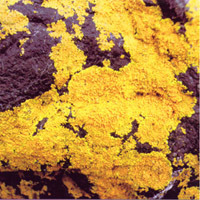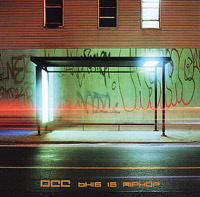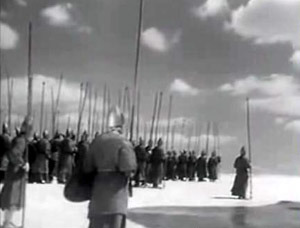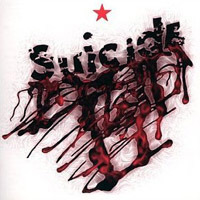Special Feature: Winter Music
New York-based musicians discuss what they’re listening to this winter
The music we choose to listen to in the winter probably speaks to our opinion on the season. Dark and sludgy? Bright and hopeful? Do we indulge the shorter days and with suitably cold sounds or instead optimistically reflect winter’s crystalline crispness?
For this article, NYFA Current asked four New York-based musicians—Alan Vega, Marilyn Crispell, Stuart Argabright, and Lisa Bielawa—to discuss what “winter music” means to them and what music they’re listening to this winter.
Alan Vega
Stockhausen, for one, I love. Perfect winter music. It really evokes it for me. La Monte Young, too. Those tone compositions. Pan Sonic: you can’t get any colder than that. Of course there’s Terry Riley’s Rainbow In Curved Air—it’s a masterpiece. Vivaldi’s The Four Seasons. Stravinsky’s Symphony of Psalms is wintry. I love that thing.
Right now I’m mostly watching films and listening to their soundtracks. I’ve been watching a lot of TV while finishing my new album, goofballing and watching a lot of TV. Listening to how the sound works in television and movies. Sound is so important to movies when you really start to listen to it. It really makes the scene. Looking can be nothing but sound can make it.
Lately I’ve also been into Tupac. I never really got into him when he first came around. He really got better with age: his fucking lyrics, the tone of his voice… man, that guy was a genius.
Mozart is definitely cold weather, man. Some of his masses, man. And Coltane. “The Father and the Son and the Holy Ghost” from Meditations. This guy I knew had these huge old speakers—this was in the late ’60s—and Coltrane literally knocked me back off the chair. I was on the floor from that shit.
As told to NYFA Current Editor Nick Stillman.
Alan Vega is a founding member of the group Suicide.
Marilyn Crispell

Deepness, darkness, silence, vast space, big sky, coolness, longing, sadness.
Scandinavian music, basically. I’ve been involved with Scandinavian musicians and have toured a lot over there. I love Scandinavia. I love the weather. I like winter better than summer, and for me, Scandinavia evokes the winter. Sometimes there are lit torches inside restaurants; there’s fire everywhere, which makes it feel so mystical and magical. I remember playing at the Umeå Jazz Festival when, after the concert, a lot of the musicians got together in a hotel room. It was cozy and warm and people sang a Swedish birthday song for one of the musicians in a four-part harmony.
Music that gives me an especially wintry feeling: kylling. This is a kind of high-pitched, wild, and eerie-sounding singing that mostly comes from the north of Sweden. It has to do with getting the cows to return when shepherding them across mountains. One singer I’ve worked with—Lena Willemark—does this. She visited a lot of old people in Sweden and collected songs from them; hers has a modern touch to it. At Christmas this year I played a lot of her stuff. There’s also a duo of Swedish violinists—Pakkos Gustaf and Ole Hjorth—who make beautiful winter music. A Swedish friend gave me a CD of them playing duets; it’s very joyful. I also listen to anything by Anders Jormin, a bassist who plays on Spring Tour, which is a trio of him, me, and Raymond Strid. And the quintet recording In Winds, In Light I did with Raymond, Lena, and Karin Nelson.
Also the Estonian singer Kärt Johanson. Her stuff is very dark and meditative and slow and, apparently, very typically Estonian.
As told to NYFA Current Editor Nick Stillman
Marilyn Crispell is a jazz pianist and composer. After playing with musicians such as Anthony Braxton and Reggie Workman she has recorded many albums with a diverse cast of jazz and experimental musicians. She will be playing in a trio with Mark Helias and Paul Motian at the Village Vanguard in New York from February 27-March 4 and at Roulette in New York with Danish saxophonist Lotte Anker on April 13. Crispell is a three-time NYFA Artists’ Fellowship winner in the category of Music Competition.
For more information on Marilyn Crispell, visit www.marilyncrispell.com.
Stuart Argabright

The Knife’s Silent Shout sounds good during blizzards that inspire aimless walks through the deep canyons of the Financial District, when you always end up soaking and gripping a teacup with two hands at a restaurant in Chinatown.
Some songs from Lou Reed’s Transformer seem to fit the stay-at-home, inward-looking mood.
Keith Jarrett’s piano improvisations lock into a trancelike flow when the snow blows outside the living room window.
Choice pieces from Joy Division’s Closer go down cold and fine when days are short.
My friend and I drive upstate to hike during the winter. Sandy Bull, John Fahey, and Neu! play in the car during our rides. Bull’s crisp picking, Fahey’s west coast waves, and the motorik pulse of Neu! bolster us against the freeze we’ll plunge ourselves into.
Returning to the car, we kick our boots off and settle back in, aided in our passage along sleepy roads and highways by long re-listenings to early Kraftwerk, Cluster, and Aphex Twin’s Selected Ambient Works 2, coming down from the hills.
Stuart Argabright’s bands include Death Comet Crew, Ike Yard, the Dystopians, and Dominatrix. He compiled the most recent volume of Soul Jazz Records’ compilation of underground New York City music from the early 1980s, New York Noise Volume 3.
For more information on Stuart Argabright, visit http://DeMeDo.blogspot.com.
Lisa Bielawa

Being a particularly strong advocate for richer artistic experience through eschewing explicit references in music (since it is the art best equipped to dwell and deal in the abstract rather than the depictive), I was sheepishly surprised to discover that the first two pieces I thought of when asked what music evokes winter to me were quite literal: Vivaldi’s “Winter” and Prokofiev’s “Alexander Nevsky.” The Vivaldi piece is particularly close to me; just before I gave up playing the violin (at the ripe age of 14) I had one last fling with it, playing the solo part in “Winter” with a community youth orchestra in San Francisco. This was a difficult interpretive performance for me because I, having spent my entire life until that point in California, had actually never seen snow fall in my life. Years later, in 2000, I wrote a piece called “unfinish’d, sent” that was spurred on by my unresolved feelings about this parting ritual. It is a setting of nine words from Shakespeare’s Richard III—which starts “Now is the winter of our discontent made glorious summer…”—(although these words were not among the ones I set), and it quotes whole passages from Vivaldi, some of them upside-down.
The Prokofiev score was written to accompany the eponymous film by Eisenstein. It opens with the orchestral instruments playing a stark, primitive, wailing melody in unison at a four-octave remove. Prokofiev’s unmistakable mastery of evocative orchestration is especially vivid in the “Battle on the Ice” section, which features brittle, sharp, high winds in short phraselets, alternating with very low, sharp, rhythmic writing in the tubas and low strings and other sections that have shivering strings in static textures that seem “frozen.” Throughout he uses the whole symphonic range, high to low, emphasizing the extremes, and with little fluidity. This gives a sense of huge, open expanses of icy terrain.
This section of Eisenstein’s film includes the famous scene of battle horses falling through the ice. Chilling, indeed.
Composer-vocalist Lisa Bielawa is currently at work on a Creative Capital-sponsored, site-specific project for 12 instruments and a soprano entitled Chance Encounter. Her website is www.lisabielawa.com and she also blogs about her experience and activities as Composer-in-Residence at the Boston Modern Orchestra Project atblog.myspace.com/lisabmop.





